|
We may be well-acquainted with Lenten practices and devotions such as giving something up, abstaining from meat, or praying the Stations of the Cross. It can be more difficult, however, to name ways to observe the Easter season.
Yet in the Preface of the Eucharistic Prayer at every Mass during the Easter season, we hear: “It is truly right and just, our duty and our salvation, at all times to acclaim you, O Lord, but in this time above all to laud you yet more gloriously, when Christ our Passover has been sacrificed… Therefore, overcome with paschal joy, every land, every people exults in your praise and even the heavenly Powers, with the angelic hosts, sing together the unending hymn of your glory…”[1] What is “paschal joy” and how do we praise the Lord “more gloriously” in the Easter season? It is unreasonable to expect anyone to will themselves to be happy at any given moment, much less for an entire season. But joy is not the same as happiness, nor is it the absence of sadness. Joy is a fruit of charity. It flows out of love; it results from a participation in goodness. We feel joy in the presence of someone or something we love; we rejoice in the well-being of our loved ones. If our Lenten observance is focused on charity—particularly acts of charity such as prayer, fasting, and almsgiving—then joy flows naturally from them. The disciplines that turn our gaze outward to God and neighbor, the sacrifices we make, are all a participation in goodness, an act of love. Paschal (Easter) joy, then, can be seen as the fruit of our Lenten journey. Our Lenten efforts are not meant to be temporary measures. They are intended to effect lasting change in us, to conform us more profoundly to our Lord who died but has been raised. What can we do then, so that we don’t simply drop our Lenten observance now that Easter has arrived? How can we instead allow these observances to take root in such a way that they enable us to celebrate the Easter season more fully and joyfully? Consider one or more of the following suggestions to cultivate paschal joy and fill each of the fifty days of the season with festivities and devotions:
Click here for more resources to accompany you this Easter season. [1] Preface I-V of Easter, Roman Missal, Third Typical Edition. [2] Directory on Popular Piety and the Liturgy, no. 150, no. 152. [3] Directory on Popular Piety and the Liturgy, no. 153. [4] Directory on Popular Piety and the Liturgy, no. 154. [5] Directory on Popular Piety and the Liturgy, no. 155. [6] Cf John Paul II, General Audience, Wednesday, 30 May 1979
0 Comments
I often find myself avoiding sad and painful things, searching to find a silver lining and help make me or someone else feel better. It can be at the cost of seeming empathetic, too, like avoiding sitting with the pain and instead dealing with it head on. My immediate reaction is to fix something broken or to solve a problem instead of to actually let it sink in and affect me. Growing up, this was a coping mechanism that I’ve been able to turn into a strength of mine as a teacher, making split-second decisions and problem-solving throughout the day. Personally though, I think I need to wrestle with it. As we enter into the saddest, most heart-wrenching day of the year, my gut says “avoid the topic, think about Sunday,” but instead I’m going to go a little deeper for Good Friday this year.
Good Friday was what I can only imagine to be a marathon of a day for Christ to endure, only to end with his sacrifice in the Crucifixion. The brutality and agony that he must have felt while carrying his cross can be overwhelming to think about. He carried it bleeding, tired, hungry, and aching from the weight of such an enormous cross. I’ve never experienced pain like that, so I’ve found it easy to skip through, acknowledging it happened and moving on. But this is where I’ve gotten it wrong: Christ did all of that for me, for us, for every human being on this Earth. Jesus did that so we wouldn’t have to experience it for ourselves and could be together with God in his Kingdom one day. This day is the one I shouldn’t overlook. The Stations of the Cross, a 14-step reflection on the Passion of Christ, is the perfect place for me to start contemplating Christ’s sacrifice on Good Friday. While there are many versions of this devotion, I’m using the Stations of the Cross in the Spirit of St. Vincent Pallotti to help me think more clearly about the meaning of Good Friday. There are many different Stations of the Cross to use depending on your spirituality, vocation, or age. In my classroom I like to use a coloring book version and when I taught 2nd grade, we liked this one for children. For this year’s study, I think I’ll also try this Scriptural Stations of the Cross from the USCCB’s website, located on the Catholic Apostolate Center’s resource page as well. I hope to think more deeply and clearly about the Passion of Christ and appreciate a little more heavily the price he paid for me, everyone I know, and beyond. There are many signs throughout this Triduum that we can think about in addition to praying with the Stations of the Cross. Tonight on Holy Thursday, the tabernacle was emptied and colored cloth was placed there instead. There will be no consecration of the Eucharist until the Easter Vigil and instead of Mass, we pray, remember, and venerate the Cross. The color for Good Friday’s services changes too: red is now the color we see and use to remember his blood shed for us. Red was also the color used on Palm Sunday, when Jesus made his way through palm branches on a donkey into the City of Jerusalem in joyous celebration. These signs in church help us remember all that Christ did for us. We may take his sacrifice for granted possibly because it is easier to avoid the sad and scary realities about the time between Jesus’ arrest and Easter morning. We also may be too “busy” to stop and reflect on not just the happy moments when Jesus was teaching, but also how he gave His life to save ours. In our lives, we must continue to appreciate and enjoy the good parts of Christ’s life and ministry. We can live knowing that the end is happy and He is Risen on Easter morning. But without Good Friday, we wouldn’t have Easter Sunday. Tomorrow on Good Friday, I invite you to join me on this sad and painful day as I look more deeply at the Stations of the Cross. For additional resources, please visit the “Additional Lenten Resources” page on the Catholic Apostolate Center page. Next week is Holy Week. Before we arrive there and enter the most solemn of days of the Church year, the Easter Triduum, we come to another Solemnity during the Lenten season. Last week, it was the Solemnity of St. Joseph, spouse of the Blessed Virgin Mary and patron of the Universal Church. Tomorrow, it is the Solemnity of the Annunciation of the Lord. Both offer us examples of how to respond to God’s action in our lives. The Blessed Virgin Mary and St. Joseph responded freely and fully to God’s invitation announced by the angel to move in directions that they did not expect. While we may not have an angel announcing God’s will for us, in what ways do we discern the direction that we are called to take? Recently, I attended the religious profession of a Benedictine monk who is a former student of mine. Some of those who attended the Mass and profession ceremony in support of him were also former students who are now either diocesan or religious priests or married with children. (Some are also former staff members and collaborators of the Center.) Each in their own way has followed God’s invitation to them. In and through their chosen vocations, they have found joy in living more deeply their Christian life.. While they have found joy, they also know what it means to take up the cross and follow Jesus Christ as his disciples. None of them made the choices that they did easily, but did so through cooperation with the grace of Christ. We are called to the same. Holy Week offers us an important opportunity to reflect, discern, and act on God’s will in our lives. Join us on social media for our Virtual Holy Week retreat. We offer it as a way of doing this type of discernment in the context of this most solemn time. Please know that our prayers are with you, especially during the Easter Triduum and season. May the charity of Christ urge us on!
Lent is the perfect time each year to do a personal assessment of our relationship with Jesus – to see if we are walking the path to sainthood as we are called. God calls each of us to become saints and it is imperative that we evaluate our spirituality, our actions, and our goals. This year I have been using three specific resources to aid in my self-reflection and in resetting my focus. Fr. Thomas Dubay’s Happy Are You Poor, Matthew Kelly’s I Heard God Laugh, and the music of Danielle Rose are helping me with my grand reset.
During this beautiful time of Lent, my individual assessment of my growth in holiness is both difficult and reassuring. In reflection, I am reminded that I am here to live out the Beatitudes – not to have memorized them, but to daily use the opportunities in my station in life to live them out. God also reveals to me that I am not to be like my favorite saints, but to become a saint by being authentically me, the unique person He created me to be. He also continues to enlighten me about deeper ways to communicate with Him in prayer. Little snippets in the morning give me focus to be the living sign of God’s love in the world I walk in. Then, throughout the day, I ask for help to physically live out the mission He has called me to. Simple little mantras such as: “Lord, help”, “Jesus, not my words and responses, but Yours”, “Jesus, Mary and Joseph give me strength and courage” are prayers I repeat throughout the day to help me remain in God’s will and not in my own. Growing in our Christian life is a continual moment by moment journey of self-discovery. The more we grow in love of Jesus, the better we come to know ourselves and the importance of our individual participation in His glorious mission in the world. I am struck by the essential commitment I must have to become who I was created to be, because that is how the presence of our Lord Jesus Christ is made known to those around us. “When you hung upon the cross looking at me, You didn’t die so I would try to be somebody else. You died so I could be the saint that is just me” is the refrain Danielle Rose sings that speaks of the magnitude of Jesus’ love for each of us and the intimate connection He desires with us. These little rituals and inspired guides keep me grounded as I live in the messiness of my humanity in this complicated world. Another aspect of my relationship with Jesus that I am examining comes from Happy Are You Poor. Fr. Dubay helps us to understand the things we are attached to, and why, and if these attachments are leading us deeper into the heart of Jesus or driving us away from Jesus. This is always a difficult process because I have to repeatedly admit to the things I am attached to that bring me temporary comfort and feed my selfish nature, and then I have ask for the grace to let go of these things I cling to so that Jesus can live in me. These practices in Lent are difficult, but not out of my reach. I attend daily Mass as frequently as possible and this communion builds the holy virtues to let go of my earth stuff, my temporal comforts, and to open myself to be God’s. At the beginning of each Mass, we recognize our fallenness and verbally repent and commit to do better. God’s love and mercy are always available to us so that we can change for the better. That is the assurance that keeps me striving. And in the quiet after receiving the Eucharist, I speak in my mind part of Psalm 95: “For You, O Lord, my soul in stillness waits, truly my hope is in You.” Matthew Kelly gives me such tangible and direct instruction to realign my life within God’s will. His emphasis on deepening our prayer life and then giving direct ways to accomplish this are worth reading and putting into practice. He speaks to us in the reality of our busy, chaotic, and very full lives with a simpleness that I can relate with. His theology is completely understandable and therefore gives me assurance that I can put it into practice in my daily life. Lenten rituals cause us to be uncomfortable in our flesh (as Jesus was in the desert) so that we can be totally dependent on our God to lead us. This examination, this ‘coming clean,’ is a necessary element of our Christian journey. Receiving the Eucharist to nourish us and receiving absolution in the Sacrament of Reconciliation are the wonderful gifts we have to assist us in our closer walk with Jesus and in fulfilling the individual purpose of our lives. Finding scriptures to meditate upon and asking God to reveal what He wants us to do daily to lead us to deeper levels of intimacy with Christ. All of these are designed to enlighten us, to transform us, and to bring us to a more joyful celebration of the victory of Easter! So, my fellow comrades, embrace the work that this season of Lent provides so that we may all grow deeper in love with our Lord and He may live and move and breathe through us! “Lord make us turn to you, let us see your face that we may be saved.” -Psalm 80 Click here for more resources to accompany you this Lenten season. “O my people, I will open your graves and have you rise from them, and bring you back to the land of Israel. Then you shall know that I am the LORD.”-Ez. 37:12-13 “Come out!” The words reverberate and resound in the stench-filled tomb. We too need to hear the words proclaimed to the dead man as we approach the end of our Lenten journeys. Come out! Lent has been our own time of preparing for resurrection—abstaining from anything that deadens us to the voice of Christ inviting us to the fullness of life. For the past few weeks, we have participated in spiritual practices that renew and refresh our spirits. We’ve journeyed with Jesus in our own deserts. And the culmination of this journey is about to occur in only a couple more weeks. Lazarus’ resurrection precedes the Resurrection that changes everything. It is a glimpse of what awaits us after death. The once rotting man stumbles out of the dark and into the light of Christ—his dear friend. Lazarus’ sisters, Mary and Martha, do not even say his name when telling Jesus of his illness, but identify him simply as “the one you love.” The one you love…What a beautiful way to be identified. I think about this for a moment before realizing this is what we are all called to and all invited to: to be the ones Christ loves. This short phrase is our deepest identity as baptized sons and daughters. We are the ones He loves. And as we prepare for Holy Week and Easter Sunday, this reality will be fully demonstrated: “For God so loved the world that he gave his only Son” (John 3:16). Jesus will tell us on Good Friday, embracing us with arms wide open on the Cross, “you are the one I love.” As a result of this great gift, Christ can call us to resurrection—not only after death, but in the here and now. So many realities in our world today threaten to numb us from this true reality. Perhaps we find ourselves in Mary’s shoes. When she and her sister hear of Jesus’ coming, Martha runs to meet Him, but Mary stays where she is. Was hope dead within her? Was she too consumed with her grief to dare to have faith? Did death have the last word? Perhaps many of us feel the same way: disillusioned. Tired. Grieving. Doubtful. But Mary’s sister, Martha, shows us another way. Her path leads to the resurrection of her heart in the here and now. In today’s Gospel, the sisters seem to have traded places. Today, it is Martha who chooses the better part. She runs to meet Christ at the moment she hears of His coming. In spite of any doubt, fear, disillusion, or grief—she acts in hope. And this leap of faith is what enables her to give Jesus her all and say, “Lord, if you had been here, my brother would not have died. But even now I know that whatever you ask of God, God will give you.” (emphasis added) (John 11:22) In these words, I hear her say, “Lord, I am disappointed. I am grieving. My brother has died and you were not here. Had you been here, he would have lived. But I give this desire to you. I trust in you. Let it be done according to God’s word.” This, in a sense, can be Martha’s fiat. Her surrendered disposition, mixed with faith, trust, and hope, is what then enables her to confirm, “Yes, Lord. I have come to believe that you are the Christ, the Son of God, the one who is coming into the world.” Martha has joined the woman at the well and the Apostle Peter in confirming Christ’s identity as the Messiah. She has “come out” of her own tomb. This past calendar year has likely felt like a tomb for many of us. Perhaps we feel most like the seemingly abandoned Lazarus languishing in the dark. “Where were you, Jesus?” we may ask with Mary and Martha. “Do you not care that the one you love is suffering?” Jesus does more than care. It is so comforting to read that “Jesus wept” at the knowledge of Lazarus’ death and became greatly perturbed. I can imagine the same, if not a greater, reaction at the death of his earthly father, Joseph. Christ weeps at our suffering. The Creator shudders to see His creation perish. This is not what we were made for. And in His humanity, Christ weeps with us and for us. But not only will the Son of God weep for His loved ones; He will die for them in just a few days. It is not enough for Him to acknowledge our suffering—He takes it on. He transforms it. He transfigures it. He resurrects it. As we approach the end of the Lenten season, let us not stay put with Mary but run out with hope like Martha. I pray this Easter Sunday to say firmly with her, “Yes, Lord. I have come to believe that you are the Christ, the Son of God, the one who is coming into the world.” We are the ones whom He loves. Let us spend some time relishing, resting, and growing in this identity in the remainder of the Lenten season and beyond. In these final weeks of Lent, let us continue to “come out” of our tombs with our prayers, fasting, and almsgiving so that we may not stumble as Lazarus did but run out towards Him who calls our name. Let us come out into the light. For more resources to accompany you on your Lenten journey, please click here. Click here for this Sunday's Mass readings.
I’m not much of a poetry person. I did what I could to avoid it in middle and high school, as well as college. But there is one poem that I like—in fact, that I love. It goes like this:
“Hope” is the thing with feathers -
That perches in the soul - And sings the tune without the words - And never stops - at all - And sweetest - in the Gale - is heard - And sore must be the storm - That could abash the little Bird That kept so many warm - I’ve heard it in the chillest land - And on the strangest Sea - Yet - never - in Extremity, It asked a crumb - of me.
That is “Hope is the Thing with Feathers” by Emily Dickenson. I always liked the poem, the way it rhymes and the way it rolls off the tongue. It became even more important to me when my father became ill. I clung to this poem because it reminded me that hope is always with us; that even in the greatest storm, hope remains and remains without ceasing.
As Christians, we cling to hope. This season of Lent which we find ourselves in right now is a period that prepares and leads us to that ultimate instance of hope in the Christian life: the Resurrection. Much like the hope that Dickenson writes of in her poem, the hope of the Resurrection remains with us at all times. It never stops, it remains with us in our souls, and it is, if I may create a word, “unabashable.” The thing is, it can be hard to see this hope in our lives, regardless of its unceasing presence. Pope Francis dedicates two paragraphs of Fratelli Tutti to the virtue of hope. He writes: Hope speaks to us of a thirst, an aspiration, a longing for a life of fulfillment, a desire to achieve great things, things that fill our heart and lift our spirit to lofty realities like truth, goodness and beauty, justice and love… Hope is bold; it can look beyond personal convenience, the petty securities and compensations which limit our horizon, and it can open us up to grand ideals that make life more beautiful and worthwhile” (Fratelli Tutti, 55). Hope transcends our ups and our downs, our individual trials and tribulations, not because they are insignificant, but because the Resurrection, in the end, is greater than every one of those. The hope of the Resurrection doesn’t minimize our trials, or even our personal convenience and petty securities, but it is the light which illuminates the darkness and allows us to move past them on our journey with Christ. The hope of the Resurrection, the hope of Christ perches in our soul and it sings the tune of Alleluia (pardon my use during Lent) without ceasing. This hope, much like the little bird that Dickenson describes, is in fact sweetest in the gale, in the storm, because we are called to recall that Jesus Christ will provide for us in ways that no other person or thing ever can. In the midst of Lent, much like through all of our sufferings, hope can be heard as a melodious tune above the groans of those trials which we face. May we look to hope, the thing with feathers, the Resurrection, this Lent and always. For more resources to accompany you during your Lenten journey, please click here.
I’m always skeptical when I hear others describe instances of suffering as “blessings in disguise.” Can you imagine breaking your arm and having a friend say, “That’s a blessing in disguise!” – while you’re still sitting in the ER? Sure, they might be right eventually; but in that moment you would be in too much pain for their words to be helpful. You might even consider deleting that friend’s phone number. The events of the last year have made it even harder to recognize such hidden blessings. Amidst universal confusion, we are thirsting for straightforwardness. Maybe that’s why today’s Gospel reading is hitting me differently. In this passage, we receive a clear and radiant report of Jesus’ person and ministry: “For God so loved the world that he gave his only Son, so that everyone who believes in him might not perish but might have eternal life.” In these words, we find Jesus directly offering Himself and extending His invitation to each one of us: believe and trust me. He is unmasked, undisguised. Now, will Jesus’ straightforwardness give me the courage this Lent to step out from behind my own disguises? Focus (Social Justice): Today’s Gospel suggests that darkness is part of the human experience. When I reflect on the world, the United States, and even my city of Washington, D.C., there is surely darkness preventing us from achieving equality and equity for all. This darkness is within me too, in the moments when I doubt change is possible. God acknowledges this darkness by sending his light and messengers into the world. Their examples help guide us and strengthen us. Is there a particular messenger who inspires your own prayers and actions this Lent? Prayer: God, thank you for this life and journey. Please help me along the way. When the world seems dark, please help me remember the hope and humor you’ve placed in my heart. When my own darkness attacks me from within, please help me to reach out beyond myself to others. You have placed good friends in my life – help me to remember they are there for me! Please help me to be a friend and helper in return. Amen. Service Suggestion: This Lent, reach out and call or Zoom each week with someone in your life who you haven’t seen or heard from in a while. You may help to reduce the isolation that person may be feeling during this lengthy pandemic. This reflection is from the 2021 Lenten Reflection Guide. To access the complete guide, please click here. I am grateful for the occasion to share just a few reflections on my discernment journey and priestly ordination during the pandemic, the “COVID class” of 2020! It was about one year ago—March 2020—with less than two months before graduation from St. Mary’s Seminary in Baltimore, MD and ordination scheduled for June when those plans began to change. Like the many high school and college students preparing for graduation, my deacon classmates and I (and the rest of the seminary) were sent home to complete our coursework alone online. Like the many engaged couples preparing for their summer weddings and receptions, our priestly ordination dates were postponed and receptions cancelled. While trusting in God’s grace and purpose, how could I help but feel at least a little disappointed and even frustrated? And yet, therein lie some important lessons God wanted to show me about the life we are each called to live. Every vocation—life’s path and purpose—begins by accepting our way is not always God’s way, and our time is not always God’s time (Isa 55:8-9). And yet, I’ve slowly recognized a great freedom in that fact. A vocation is not about “planning out” your life, or making sure things happen the “right” way. Life does not follow a predetermined script. A vocation is not an intellectual puzzle we work on and hope to “figure out” (or else fail…), but a stepping out in faith day-by-day. Vocation is more about letting go of the controls to be free enough to move in the direction God beckons. A vocation is always a dynamic response to God’s call from a place of freedom and love. And so, while a vocation does involve making a free choice, it’s not about calling the shots in life or predicting the future, but trusting God with the simple question, “where and what next?” Due to the COVID lockdown of 2020, I realized the date and circumstances of my ordination were beyond anyone’s control. Some suggested having small, private ordinations so we would become priests “sooner,” even if we still couldn’t yet go out and serve in parishes, but respectfully, I personally disagreed with that idea. The pandemic re-affirmed my conviction that we were becoming priests for the people of God, not for ourselves. Compared with the physical and emotional toll of the pandemic, the waiting game was an easy burden to bear. The background of the pandemic created a new context to reflect on what shape my life and ministry might take. In our society’s fixation on “finding our best selves,” the gospel-centered vocation acknowledges that “whoever loses his life for my [Jesus’] sake will find it” (Mt 10:39). Vocation is part of our personal participation in the great “mystery of faith,” the “Paschal Mystery” of Christ’s death and Resurrection the Church celebrates most powerfully in Lent and Easter. We cannot experience the true Jesus without both his Resurrection and Cross, and so every authentic vocation will have both its cross (struggle and sacrifice) and its resurrection (joy and victory). However you discern, expect your vocation in life to feel like both at times. Amidst the hardship of our world, a small taste of the patient suffering of the Cross leading up to my ordination turned out to be a small but precious gift not to take for granted. For months during quarantine, I watched medical professionals and other essential workers care for the sick and deliver basic needs—the corporal works of mercy—on the local, national, and international stage. As a deacon waiting in the wings to be deployed to a parish, I felt primed to be sent and make an impact. But all I could do was stay home and pray the Liturgy of the Hours. That summer I did not feel heroic or “essential.” Having been fed a steady diet all through seminary of “the Church needs you!”, I had to accept it wasn’t my moment to be a hero or an influencer. My call was behind-the-scenes mission support, not leading the charge on the front lines. Following Jesus’ instruction to “watch and pray” (Mt 26:41) as others experienced trial and suffering in hospitals and homes challenged me to rid myself of any pretensions of being a priest as being God’s biggest hero. Vocations—religious or secular—motivated by the muscular desire to save the Church/world and solve Her problems almost always end up hurting people in strongarmed attempts to fix whatever they perceive as broken. Before the Cross, there are times all we can or should do is “behold” the brokenness and hurt (Jn 19:26). On the eve of ordination, that forced inactivity was excruciating, but it also drove home a humble admission behind every vocation: I need God more than God needs me. The Cross is essential to Jesus, and beholding Jesus in the sick and suffering, God became more essential to me. To “behold” is not to evade responsibility, but to see that our suffering does not go unnoticed and unredeemed. Not coincidentally, it is on the Cross that we truly see Jesus as our eternal High Priest, the model of priesthood, who is willingly sacrificed for the redemption of our sins. And so, the experience of being ordained a priest during the pandemic, while full of spiritual and personal challenges, also became the occasion for greater reflection on my identity, vocation, and mission. The delay was not lost time, for any time spent with Christ in prayer or service is only counted as gain. I was ordained a priest of Jesus Christ on August 22, 2020. Behold and follow the Cross, and who but God knows where it may lead! For more resources on Vocational Discernment, please click here. For more resources to accompany you through the COVID-19 pandemic, click here.
This Lent looks a little different than it has in past years for many reasons. With a little boy starting to walk, it feels like things are changing fast at times and very slowly at others. I’m looking towards speeding things up to get to new milestones like running and talking, but also praying time can stand still enough to savor precious moments and little giggles. In Lent now, we are waiting for Easter and likely wanting to speed through this time of personal reflection, penitence, and prayer. Maybe if we try to slow down and take a moment to reflect, we’ll discover some time we can put into our relationship with God in a meaningful and intentional way.
This Sunday marks the Second Sunday of Lent and there are some really poignant readings to note for our hardened selves. I think they all tell of a hope and light at the end of the tunnel for us in this dark and restless time. The second reading especially tells us to not give up because God has already provided: Brothers and sisters: If God is for us, who can be against us? He who did not spare his own Son but handed him over for us all, how will he not also give us everything else along with him? Who will bring a charge against God’s chosen ones? It is God who acquits us, who will condemn? Christ Jesus it is who died—or, rather, was raised-- who also is at the right hand of God, who indeed intercedes for us. (Rom 8: 31b-34) This line, “If God is for us, who can be against us?” tells us so much about our God. He is always on our side, no matter what. If God is for us, we can build up a broken relationship with him. If God is for us, we can consider our sins in the Sacrament of Penance and be reconciled. If God is for us, we can slow down and take a moment to breathe in and out in mindfulness. If God is for us, we can have the strength to carry on through this pandemic, perhaps alone physically, but never truly alone. We are never truly alone or abandoned because at the end of this Lenten tunnel, Christ is there waiting for us with open arms and a tissue to wipe our tears. There is beauty in the waiting, and we’ll probably regret it if we don’t allow ourselves to vulnerably open our hearts and our lives to Christ. So how can we build our relationship with God? How do we prepare our hearts for Easter, while still savoring this waiting and dark time before Christ comes? When we are fearful, where can we turn? When we feel exhausted and worn out, how do we go on this Lent? Through prayer. I teach my students about prayer during Lent because it can be the absolute best tool we have as Christians. Saint Vincent Pallotti knew this to be true, saying, “The best method of private prayer is that which the spirit of the person finds easiest and most fruitful.” He totally understands us! In his wisdom, Pallotti sought to humbly serve God through his actions and be an apostle journeying with others and teaching them about God’s eternal Love. Private prayer is so important. It can be as simple as we want it to be or as complex. We can talk to God out loud, in our hearts, through journaling, or in memorized prayers, but private prayer is essential to our spiritual lives. In the moments in which you want to slow down, try praying to God. Each time you think about the next thing that is coming and how you just need to get through it, pray. Ask God to remove your impatience and replace it with humility. Humbly putting ourselves aside during Lent can be a fruitful way to grow closer to God. Intentionality and a few personal moments are the only things we really need this Lent, for if God is for us, who could be against us? For more resources to guide you through your Lenten journey, please click here. For more resources on prayer, please click here. Last week, one of my good friends sent me a funny video of a six-year-old girl who was upset at not being allowed to go to the pub. Her father manages a local Irish women’s soccer team that her aunts play on, and they were going to the pub for their Christmas party. The little girl, who feels like the team’s mascot according to the video, wanted to celebrate with her family. After laughing and laughing at the little girl’s arguments, I realized that the impulse to share something that brings such joy is a way the Holy Spirit can work through us, bringing us together even now.
After watching the video, I started thinking about how this little girl's sense of injustice is instructive for us, too, on a deeper level. In the video, she feels deprived from good times and togetherness.; denied celebration with loved ones; frustrated at restrictions that make no sense to her; and not allowed to make her own choices. Her every plea meets with rejection and her whole world feels wrong. Could this be how many of us are feeling today as a result of the coronavirus pandemic? Are we feeling isolated, lonely, trapped, or frustrated? Do we feel unheard or rejected by God? What stark contrast we experience right now between this inner despair or frustration and the emergence of spring all around us. Spring arrives nonetheless, unaltered in its processes. I think too of how Christmas still came to Whoovile in "How The Grinch Stole Christmas"--still it "came without packages, boxes, or bags!" In the movie, Christmas comes in spite of great deprivation and loss, in spite of so many unmet expectations and plans ruined, in spite of the Whos' demonstrated vulnerability. They responded by joining hands and refusing to deny the cause for celebration that they still knew inside of them, something no one or no thing could take away. We can't literally join hands right now (well, we shouldn't!) but we absolutely can remember that God has always been in control, and will always be in control, of all creation. We can remind ourselves this Easter season that His unbounded love for us remains our source of life here and our destination eternally. We can practice countering the appearance of threats with choosing to believe God walks with us and accompanies us in the midst of our suffering. We can accept His reality as our truth and in those moments that we do, we'll know in our hearts that all will be well. We can dare to trust in the power of the resurrection—the grace and new life that Christ wants to bring into our lives even today. I'm grateful to be hanging in here with all of you. We're stronger than we know, especially when united in prayer. Although I'd be quite content not to take on any more strength training at the moment, I know that the trust I'm developing is a higher good. I hope you will find that sense as well. May we continue on in hope, inviting the life of the Resurrected Christ to flourish in our hearts and homes Donna Green resides in the Archdiocese of Milwaukee. The Easter season assaults the physical and spiritual senses, calling the body and soul to unite as we share in a mere glimpse of the eternal life that was offered to us when the gates of paradise were opened on that beautiful Easter morning. Typically around this time, the smell of the Easter flowers adorning the sanctuary remind us of new life. The scent and sight of the burning incense and candles rising to heaven with our humble cries of “Sanctus, Sanctus, Sanctus” remind us of our prayers going up to the altar of God. We reach our fingertips out to touch the droplets of water washing over us and are reminded of our baptismal promises. The reception of the Eucharist leaps past our lips and dances on our tongue as we are engulfed, body and soul, by the true presence of our risen Lord. “Alleluia!! He is RISEN!! Where, oh death, is your sting?!” The words resound from the core of our being and echo through our hearts, escaping our lips in cries of exaltation. A few short weeks ago, these words were uttered from the speakers of televisions, laptops, and phones as we ushered in the Easter season as a Catholic family and community during the coronavirus pandemic. The tangible nature of the Catholic faith and the deep-rooted sense of community that the Easter season brings made this a difficult celebration for many of us. This rich season is a beautiful fifty-day celebration spanning from Easter Sunday to Pentecost. What a challenge it is, though, to maintain our joy when our hearts feel heavy and our senses yearn to be submerged in the deep traditions and rituals of our faith. “I am a practicing Catholic”. We may have uttered these words at various stages throughout our life for various reasons. Perhaps this simple phrase is the key we inherently possess to bridge the gap we may be feeling and provide much needed balm to our weary spirits and aching senses. As many of the doors of our church buildings closed for the safety, protection, and health of our communities, the foundations of the domestic church have begun to shine forth. For many, our homes have become the sole place for worship, praise, and spiritual communion, and we find ourselves face to face with the deep reality of Saint Paul’s words in his letter to the Corinthians. “For we know that if our earthly dwelling,* a tent, should be destroyed, we have a building from God, a dwelling not made with hands, eternal in heaven…For in this tent we groan, longing to be further clothed with our heavenly habitation…So we are always courageous, although we know that while we are at home in the body we are away from the Lord, for we walk by faith, not by sight” (2 Cor. 5:1-8). And so the words, “I am a practicing Catholic” tumble around deep in our beings as we seek to uncover the answers that the groaning spirit within us already understands. We can “practice” our Catholicism in a new, perhaps, different way during this time. Do we know the power of our habits? Our habits form and inform both the nature of how we approach our days, as well as the manner in which we respond to catalysts in our daily life. What do you automatically do when you wake up in the morning? The action steps that you take both consciously and subconsciously are habits and routines that you have formed over time to serve you in preparing to approach the day that lies ahead. There are two main instigators that cause us to revise and/or disrupt our habits: the desire for change or a need to adapt due to changing circumstances around us. Perhaps at this time both of these instigators are merging to grant us with a divine opportunity to draw ourselves closer to God. Within the very practice of our Catholic faith lie “habits” called virtues that can be practiced, developed, and deepened to help us grow closer to God and to fortify our relationship with Jesus Christ through the divine assistance of the Holy Spirit. The Catholic virtues are a beautiful way to continue to explore, celebrate, and proclaim the spiritually tangible aspects of our faith. By embracing these changing circumstances around us through a contrite desire to grow in virtue, concrete decisions and actions can be taken to deepen our virtuous life. In doing so, we strive to unite our physical actions and spiritual practices to grow in virtue while cultivating our domestic churches. If, therefore, we can embrace this time in our history to strengthen our virtuous resolve to truly anoint our lives and those around us with a real presence of the Living God, perhaps we may find that, although the doors of our earthly buildings have been temporarily closed, we can embrace the opportunity to unite our voices with the cries of the saints of heaven: “Alleluia! He is Risen!” “Our hearts are burning within us!” “My Lord and My God!” Many of us are acutely aware of how the coronavirus pandemic has imposed restrictions on our daily life. Social distancing (or “self-imposed monasticism”, as Bishop Barron puts it) for weeks has drastically changed our routines but reduces the risk of infecting others. While we cannot worship, shop, entertain, work, or relax as usual, we can adapt how we carry out these activities in isolation and facilitate opportunities to foster connections with peace of mind. As a Knight of Columbus, it was at first a challenge for me to grasp how a global Catholic service order—built upon fraternity among members as a core principle—could carry out its charitable works in isolation. The needs of the community my local council usually served were not going to decrease as this crisis continued, so we found ourselves reviewing the resources at our disposal in order to comply with the federal and state guidelines of social distancing. Since we could not meet as a council to plan our actions, communicating online became the norm. My brother Knights were able to approve plans to shop for the needs of those at-risk populations, collect food and supplies for local distribution, and donate funds to the parishes we served. We reached out to healthcare workers and those who are alone to address their needs and lend a listening ear. As Knights, we’re simply caring for our communities; our Faith rallies us to action to serve in the likeness of our Founder, Venerable Fr. Michael J. McGivney and, of course, our Lord. There are challenges ahead, but we rise to the occasion through prayer, hope, and love. The doors may be closed, but make no mistake: the Church is alive! Christians and really anyone who seeks the common good are given this same opportunity to review their position in life and see if they can offer any support among their neighbors. Young families are dealing with schools and recreational areas being restricted; some neighborhoods are decorating themselves with various engaging themes, such as Christmas light exhibitions or placing teddy bears in windows, that families can drive through. In addition, those of advanced age or among vulnerable populations may not feel safe leaving their homes during the pandemic; loved ones are sending letters, making phone calls, or even stopping outside of windows and doors to share smiles and wave safely across the glass. As we restrict our time outside of our homes, we nevertheless find inspiration in the selfless actions of those continuing to minister to the physical, mental, and spiritual needs of others. Doctors, nurses, cleaning crews, food workers, priests, religious, and many others on the front lines of this crisis are faithfully doing their duties wherever they are called. The rest of us do our part by restricting unnecessary activities and offering our love to anyone in need. We may have personal doubts and worry for our loved ones, and that’s okay. We have not lived through anything like this before, but we know the Risen Lord has conquered death forever. He was with the disciples even when they doubted His Resurrection; He is with us now… and through the hour of our death. The Easter season continues. While most of the Masses we are participating in are livestreams and our usual Communion with the Lord is currently a spiritual act, we continue to proclaim “Alleluia!” Our hope has not diminished. We have no reason to fear! The victory has been won. The best is yet to come. He is risen from the dead. Glory to God forever and ever. Praised be Jesus Christ, now and always! Amen. When I made the shift to working from home almost a month ago, I was excited for a change of pace: sleeping in, a 30-second commute from my bed, working in pajamas all day, not packing a lunch. But when it came down to it, I became restless and had trouble settling down. Focusing on work was difficult. Being productive did not come easy, with my mind wandering for much of the workday. I had embraced the idea of a change of pace, but not the realities of what that change really meant.
Prayer, when I remembered to make time for it, was similarly difficult to settle into. It took me some time to realize what was happening, in part because I work in a secular field. Since I don’t spend my workdays in the Church sphere, I don’t have many explicit or subtle reminders that point my day toward God. Meetings don’t begin with a prayer. My daily tasks and conversations with colleagues don’t revolve around Church activities and ministry. I don’t interact with my pastor or bishop over the course of my day. And though I’ve made an effort over the years to weave prayer and reminders of God into my daily life, my routine has been disrupted. So, naturally, my prayer life has gone out the window. Another piece to mention is that I live alone. Normally, I have a number of social engagements in the evenings and on weekends, often with Catholic friends. Our interactions have a shared Catholic identity baked in and serve as additional reminders of faith. Now that I’ve been largely alone for a month, my days seem to blur together. It's become easy to turn in on my own thoughts and seek out distractions to numb the collective grief we’re all feeling: the loss of normalcy and a sense of security, cancelled plans, and the uncertainty of when we’ll return to some semblance of normal. And in the midst of that, I forgot to pray. It dawned on me that I’ve been given an opportunity and a challenge: I’ve been thrust into an unchosen solitary monastic existence. I have the once-in-a-lifetime chance to completely re-invent what “normal” looks like for me in almost every way. While I owe the company 8 hours of my day, 5 days a week, everything else is mine to do with as I wish. I have a blank canvas. I don’t have to dress for work, shave, or drive to and from the office. I don’t have a spouse or children to care for, no roommate, and no one to interact with here in my home... except God. If I choose to, I can rebuild “normal” with a different foundation and framework, one centered on God. But I don’t have to be a full-time hermit in order to do this well. It’s a lesson that came to me in the midst of prayer and reflection during the Paschal Triduum. Something in me tends to go too hard during Holy Week, especially on Good Friday, and I feel a need to do as much as I can to enter into the sacrifice of Calvary in solitude. Once the quiet of Holy Saturday came around, though, I realized that in the inner urgency to “do” Holy Week so well on my own, I’d forgotten to “be” in the presence of God. Here I was, waiting for Easter with nothing left to do and no one to do it with. All the prayers and meditations had been said, all the fasting was ended, and all I could do was sit and wait. It was a striking reminder that, oftentimes, we need to just be and make room for God to do some work in our lives. Archbishop Wilton Gregory, in his homily on Easter Sunday, noted how important the concept of time is to the story of our salvation, and that Easter “resets the clocks and calendars of our lives.” It's especially true in these days of being forced to reduce the externals. We have an opportunity and a choice here: to either enter into the quiet and craft something meaningful in our lives, or to just make more noise to drown out the vastness of that quiet. We’ve been making a lot of noise lately, often without realizing it. Thank God for the recent reminders of the power of the phrase, “Be still and know that I am God.” May we all take advantage of this opportunity to hit “reset” and allow God to direct us in those quiet moments. When we re-enter the world in a “new normal”, may we use the lessons from this time of isolation to shape what that normal really ought to look like. Jay Schaefer is a Professional Engineer in Baltimore, working to maintain and improve the region's transportation infrastructure. He sings in his parish choir and is involved with the Knights of Columbus. Jay is also a former staff member and current collaborator of the Catholic Apostolate Center. We are living through an unprecedented time. Just a few months ago, I couldn’t have been more excited for the spring weather, finishing maternity leave, and being able to bring my now-2-month-old to visit family and friends. That is not our reality. I am devastated that I cannot share my happiest joy with people who love my son in-person. My heart breaks for my grandmother who has never met her great-grandson, for relatives who live in different states who have yet to see him face-to-face, and for the inability to even host people safely at our home. It’s painful to think about, but knowing we’re staying safe and healthy is a relief. This past Easter weekend was when we would have been traveling to visit family. Instead of focusing on the “would-haves,” I’m challenging myself to live in the “right-nows” and the “will-bes” even though it is so difficult. Right now, my little son is snuggled and sleeping sweetly near me. Right now, my family is healthy and safe from the virus. We will be able to get through this together and will be okay when this is over, although there is no timeline to lean on. Right now, God is watching over us and protecting us as he has always done and will do. The season of Easter that just began serves as joyful relief to my fearful and saddened heart. I know that when Christ died on the cross, Jesus’ disciples were experiencing these feelings, too. In Mark’s Gospel, we read about the disbelief that plagued his followers after hearing that Jesus was not in the tomb, “When they heard that he was alive and had been seen by her, they did not believe” (Mk 16: 11). Jesus’ disciples doubted and were unbelieving, like so many of us during this pandemic. But, in John 16: 22, Christ encourages, “So you also are now in anguish. But I will see you again, and your hearts will rejoice, and no one will take your joy away from you.” In Matthew’s Gospel, we furthermore hear Christ tell his disciples, “And behold, I am with you always, until the end of the age” (Mt 28: 20). With these passages in mind, I find comfort in this Easter season knowing that however inconvenienced and pained some of us are, with God at our side this will soon pass, and we can be happier than ever before. For those who share an even more difficult level of grief from losing a loved one, may you find peace in the knowledge of eternal life with the Father. In 1986, Pope Saint John Paul II spoke to Catholics in Australia saying, “We are an Easter People and Alleluia is our song!” He went on to say, “We realize that joy is demanding; it demands unselfishness; it demands a readiness to say with Mary: Be it done unto me according to thy word’”... and later goes on to implore the Blessed Mother to pray for us saying, “Help all your children to see that the good things in their lives come to them from God the Father through your Son Jesus Christ. Help them to experience in the Holy Spirit the joy which filled your own Immaculate Heart. And in the midst of the sufferings and trials of life, may they find the fullness of joy that belongs to the victory of your Crucified Son, and comes forth from his Sacred Heart. In this way, let us try to do the same.” As Easter people then, we cannot forget that during this time of great trial, our hearts already know of great sorrow followed by even greater joy. We are fortunate to be able to stay connected through this hard time with the help of social media and technology. There are so many versions of video-chatting that we can choose from. Just saying hi to someone you miss might make both of your days a little brighter. Pictures and videos of the things that you find joyful may also bring joy to someone else, so try to share the good little things with others if you can. As we look for silver linings in this pandemic, let us pause and appreciate the good things right in front of us. Gratitude is one way to ease the pain. I’m grateful for my healthy little boy, my grandmother’s health, the beautiful day outside, my dog needing snuggles, and my husband being able to work safely from home. I pray for those who are not so lucky: those who are grieving, friends and family in isolation and alone, each and every worker who is away from their own family to fight this crisis on the front lines, and those in hospitals who are infected and sick. Right now, when I get sad about plans changing and people missing out, I stop and let Christ into my heart during this Easter season. Right now, when I start thinking of the many fears and anxieties from this pandemic, I breathe and let Christ in. Through it all, I trust that God’s will be done. In this Easter season, let us rejoice in the risen Lord! We can get through this with Christ who strengthens us! "Humanity will never find peace until it turns with trust to Divine Mercy" (Diary, p. 132). Here we are, with Divine Mercy Sunday this weekend, and instead of being in our churches with our communities, we are at home figuring out how to make this day still sacred. What do we do? Have we entered into the joy of this holy Easter season in the Church, or are have we fallen into despair that we remain in this time of “shelter in place”? Maybe it’s both? For me, I was sort of giving God an ultimatum during the Lenten season: “Lord, we will endure Lent separated from our communities, but shouldn’t you show your power and end all of this when Easter comes?” I have truly wrestled with embracing our new normal at home and fully entering into the joy of the Resurrection—the joy that comes from knowing I have been freed from the bondage of sin and death although it’s completely undeserved. We know this physical separation during the coronavirus pandemic is a way to love our fellow man, and we embrace it for the sake of love. Yet still, have our hearts embraced the message of Divine Mercy? When the message of Divine Mercy was given to Sister Faustina (and then to the world), the world was in a terribly dark place: war, hatred, and brokenness abounded. Jesus knew the world needed hope, a reminder of the infinite love He has for humanity, and to trust in His Mercy. And now, here we find ourselves in a different kind of darkness—a darkness of disease, isolation, blame, and fear. And still in this time and in this place in which we find ourselves separated from our communities, away from our physical Churches, and isolated in our homes, the Lord has gifted us the beautiful message of Divine Mercy. As Bishop Robert Barron said, “Into all the dark corners of our human experience, God’s mercy has come.” The message of Divine Mercy reminds us that no matter how dark it is, or how deep our sin runs, Jesus’ great love for us is greater still! He has defeated sin and DEATH. What more can we fear? He desires to be with us, for us to embrace Love itself. Divine Mercy is summarized by Jesus’ first words to His disciples after returning from the dead: “Peace be with you” (John 20: 19). After greeting his disciples this way, he says it again: “Peace be with you” (John 20: 21). The disciples, like us, needed to embrace the message Jesus brought, a command of peace and trust. When we trust, surrendering our hearts and lives to the one we are meant for, true peace reigns. Peace that cannot be stolen by disease or fear but that is rooted in our identity as beloved sons and daughters of the one who can conquer all things, even death. As we prepare to celebrate the Feast of Divine Mercy, may we surrender ourselves to Jesus, embracing the message of Divine Mercy— that His love on the cross, His resurrection from the dead, His love for me and for you can truly reign over our world in a time of uncomfortable uncertainty. Let us shout with joy, “Jesus we trust in you!” and allow His peace to rule in our hearts once more. |
Details
Archives
April 2024
Categories
All
|
About |
Media |
© COPYRIGHT 2024 | ALL RIGHTS RESERVED

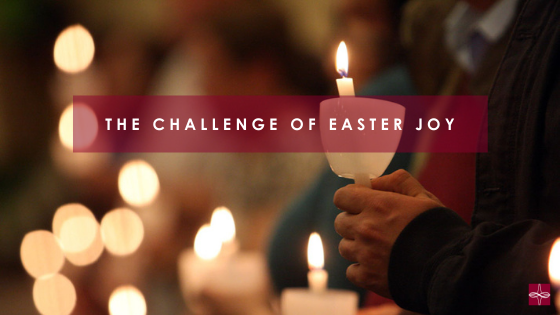

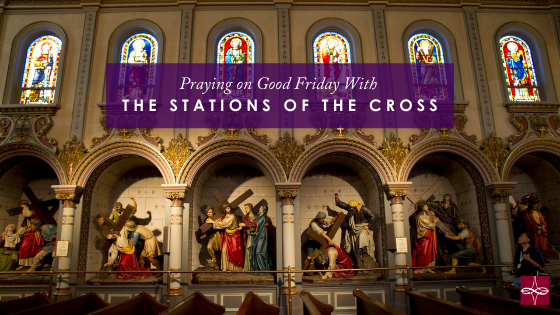

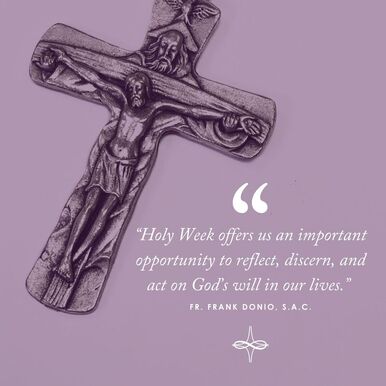
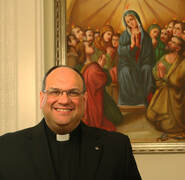
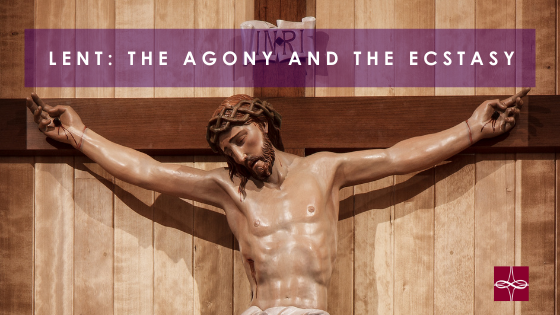

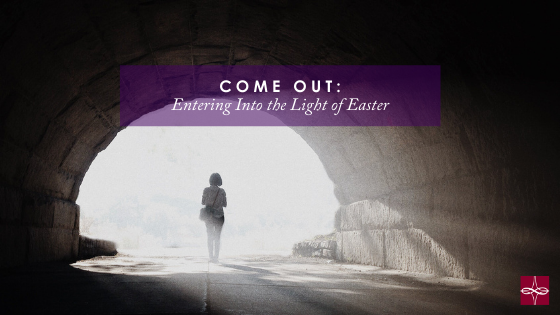

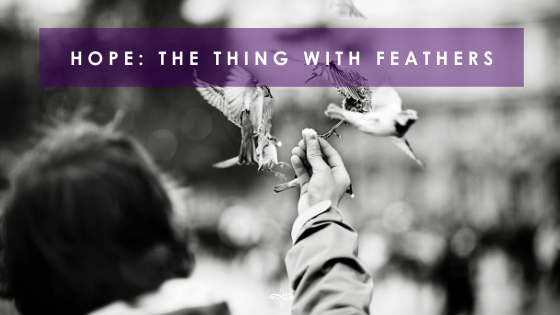
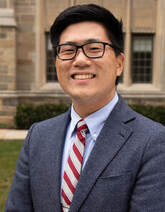
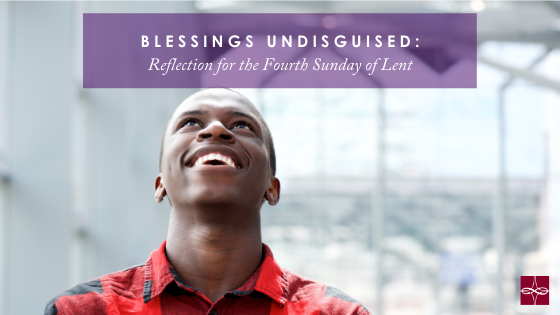

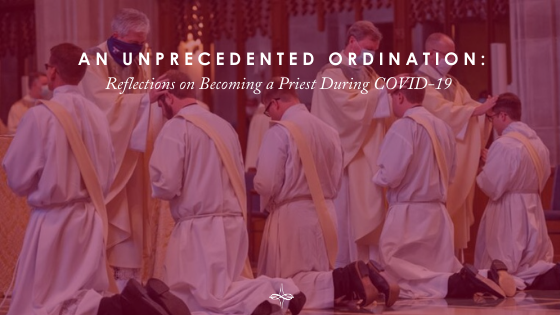
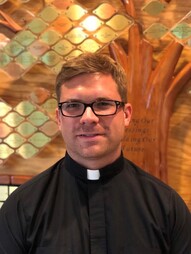
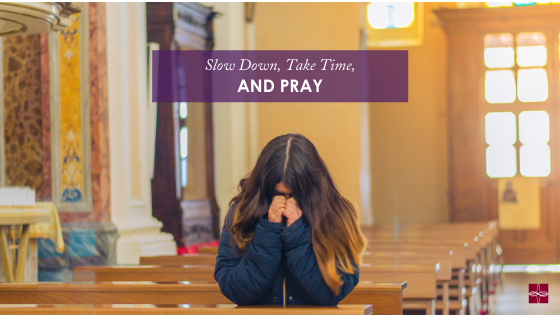
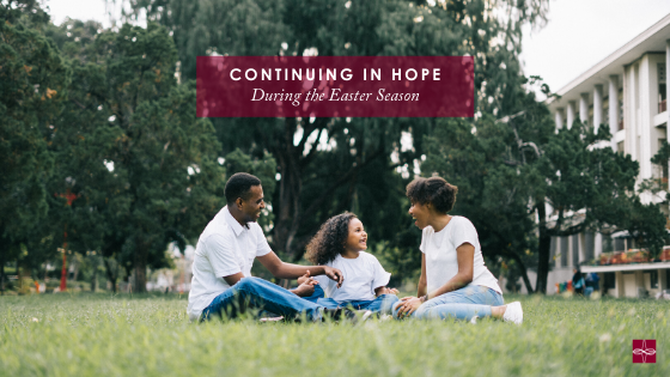
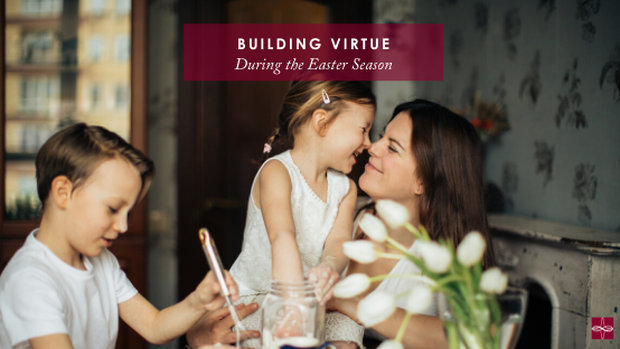

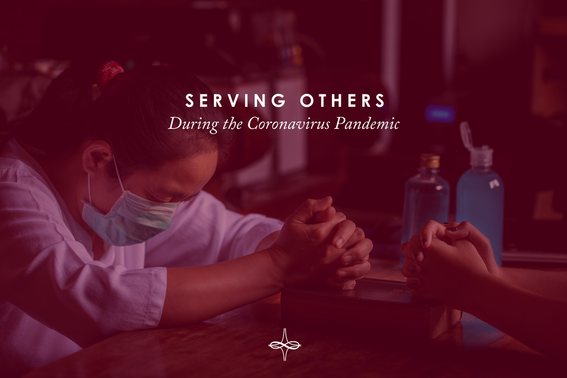




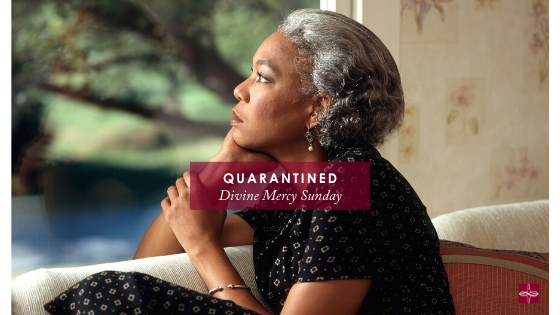

 RSS Feed
RSS Feed